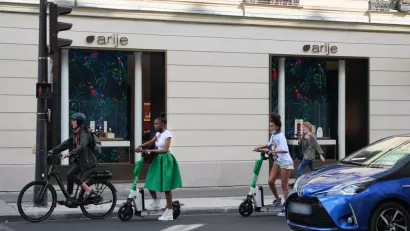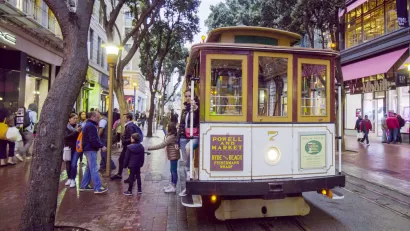The Daily Source of Urban Planning News

Study: Bikeshare Boosts Riding in Philadelphia
Public health researchers outline the benefits of Philadelphia’s Indego bikeshare network, which has encouraged more residents to choose biking over other transit modes.

Database Analyzes Global Transit Project Costs
Researchers are cataloging the costs of transit projects around the world in an attempt to identify ways to bring costs down and spend transit funding more efficiently.

Citi Bike Kills $3 Price Cap on Halloween Night
The company unexpectedly updated its e-bike pricing to eliminate a $3 cap on rides outside of Manhattan.

Why Cities Will Outlast the Pandemic Slump
A new report suggests that despite recent challenges, the ‘value proposition’ of urban activity centers remains as strong as ever.

How Buildings Can Lead the Way to a Decarbonized Future
A public utilities building in Santa Rosa shows how innovations in architecture and grid management can reduce energy use and prepare buildings for a more sustainable energy future.

Banning Electric Scooters Results in More, Longer Car Trips, Study Says
Cities should expect to see increases in automobile trips, and resulting consequences, if they ban or limit the use of electric scooters or other micromobility devices, according to new research.

San Francisco Returns $15 Million Federal Grant for Market Street Improvements
San Francisco was awarded a federal grant in 2018 that it was forced to return in 2022 because it couldn't start construction by 2025.

Flagstaff Housing Needs Outstrip Supply
Data from Flagstaff shows a growing need for affordable rental housing and homeownership options, which the city’s ten-year housing plan is working to address.

Do Owner Occupancy Requirements Constrain Housing Supply?
Born out of a fear of absentee owners and rapacious investors, owner-occupancy requirements can have the contradictory effects of excluding renters from neighborhoods and limiting the number of rental units available.

Ghosted by Your Bus?
Operator shortages are causing transit agencies to cut service unpredictably, leaving riders waiting for ‘ghost buses.’

D.C. Revamps its Vision Zero Plan to Eliminate Traffic Fatalities
Washington, D.C. was an early adopter of Vision Zero in the United States, but eventually it became emblematic of the country's lack of progress in reducing traffic collisions.

New National Monument Proposed South of Joshua Tree
The 700,000 acre monument would protect threatened species and important historic and cultural sites.

Port of San Francisco, Army Corps of Engineers Planning for Rising Bay Waters
A massive climate adaptation planning effort is underway for the docks (and seawalls and landfill) of the San Francisco Bay.

Electric Tractor Lending Library Provides Equipment to Northwest Farmers
Advocates for electrifying farm equipment are calling for more tax incentives and access to electric tractors and other machinery for U.S. farmers.

Opinion: Give Every Seattle Bus Dedicated Lanes
Painting red dedicated bus lanes can improve travel times for bus riders, encourage more people to use public transit, and reduce emissions from transportation.

PLANOPEDIA
What Is Bike Infrastructure?
Safe and comprehensive bike facilities play a crucial role in keeping vulnerable road users safe, promoting biking as an everyday transit mode, and reducing carbon emissions and traffic congestion by encouraging a shift to more multimodal transportation.

San Antonio Surpasses Supportive Housing Goal
The city provided shelter for over 1,600 unhoused people and put hundreds of new affordable housing units into the construction pipeline.

Drought Threatens Mississippi River Shipping Corridor
Disruption of shipping on the Mississippi could imperil food supplies and cost billions in losses.

MTA Sued Over Platform Gaps
Riders with disabilities say that vertical and horizontal gaps of as much as 7 inches between trains and platforms prevent many riders from safely entering and exiting trains.

PLANOPEDIA
What Is the Clean Water Act?
The primary environmental law to regulate water pollution in the United States, the Clean Water Act, went into effect 50 years ago, on October 18, 1972.
Pagination
Heyer Gruel & Associates PA
Ada County Highway District
Institute for Housing and Urban Development Studies (IHS)
City of Grandview
Harvard GSD Executive Education
Toledo-Lucas County Plan Commissions
Salt Lake City
NYU Wagner Graduate School of Public Service
Urban Design for Planners 1: Software Tools
This six-course series explores essential urban design concepts using open source software and equips planners with the tools they need to participate fully in the urban design process.
Planning for Universal Design
Learn the tools for implementing Universal Design in planning regulations.


































